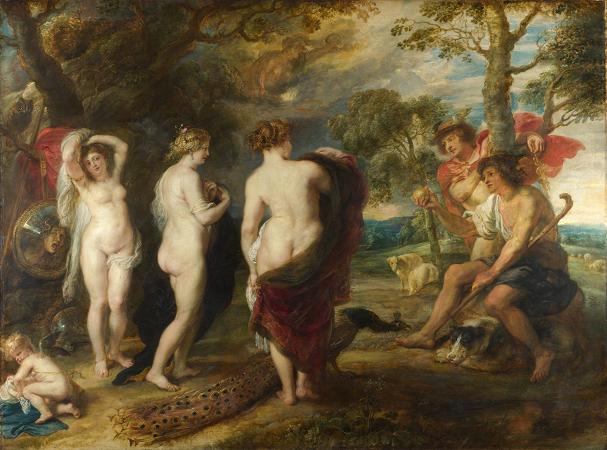Judgment of Paris. The Judgement of Paris is a story from Greek mythology, which was one of the events that led up to the Trojan War and to the foundation of Rome. Artists typically depict the moment when Paris, holding the golden apple, makes his decision. The three goddesses are shown either awaiting his choice or trying to sway his favor. Aphrodite is often portrayed as the victor, with Paris handing her the apple. In early classical art, such as on Greek pottery, the scene is more restrained and symbolic, focusing on the gods and goddesses standing in a line. During the Renaissance, Baroque, and Neoclassical periods, artists like Peter Paul Rubens, Lucas Cranach the Elder, and Antoine Watteau developed more elaborate compositions. They often depicted the goddesses in various states of undress to highlight their beauty, with Paris, usually dressed as a shepherd, sitting or standing nearby with the apple in hand. The setting is typically pastoral, with Mount Ida or a wooded landscape in the background. The Judgement of Paris became an allegory of beauty, choice, and temptation, and was also a prelude to the Trojan War. In later art, the scene sometimes takes on a more playful or erotic tone, emphasizing the sensuality of the goddesses, and reflecting different artistic approaches to mythological themes across periods. As with many mythological tales, details vary depending on the source. The brief allusion to the Judgement in the Iliad shows that the episode initiating all the subsequent action was already familiar to its audience; a fuller version was told in the Cypria, a lost work of the Epic Cycle, of which only fragments remain. The later writers Ovid, Lucian, Pseudo-Apollodorus and Hyginus, retell the story with skeptical, ironic or popularizing agendas. It appeared wordlessly on the ivory and gold votive chest of the 7th-century BC tyrant Cypselus at Olympia, which was described by Pausanias as showing: Hermes bringing to Alexander the son of Priam the goddesses of whose beauty he is to judge, the inscription on them being: Here is Hermes, who is showing to Alexander, that he may arbitrate concerning their beauty, Hera, Athena and Aphrodite. The subject was favoured by painters of red-figure pottery as early as the sixth century BC, and remained popular in Greek and Roman art, before enjoying a significant revival, as an opportunity to show three female nudes, in the Renaissance. It is recounted that Zeus held a banquet in celebration of the marriage of Peleus and Thetis. However, Eris, goddess of discord was not invited, for it was believed she would have made the party unpleasant for everyone. Angered by this snub, Eris arrived at the celebration with a golden apple from the Garden of the Hesperides, which she threw into the proceedings as a prize of beauty. Three goddesses claimed the apple: Hera, Athena and Aphrodite. They asked Zeus to judge which of them was fairest, and eventually he, reluctant to favor any claim himself, declared that Paris, a Trojan mortal, would judge their cases, for he had recently shown his exemplary fairness in a contest in which Ares in bull form had bested Paris's own prize bull, and the shepherd-prince had unhesitatingly awarded the prize to the god. Thus it happened that, with Hermes as their guide, the three candidates bathed in the spring of Ida, then confronted Paris on Mount Ida in the climactic moment that is the crux of the tale. After failing to judge their beauty with their clothing on, the three goddesses stripped nude to convince Paris of their worthiness. While Paris inspected them, each attempted with her powers to bribe him; Hera offered to make him king of Europe and Asia, Athena offered wisdom and skill in war, and Aphrodite, who had the Charites and the Horai to enhance her charms with flowers and song, offered the world's most beautiful woman. This was Helen of Sparta, wife of the Greek king Menelaus. Paris accepted Aphrodite's gift and awarded the apple to her, receiving Helen as well as the enmity of the Greeks and especially of Hera. The Greeks' expedition to retrieve Helen from Paris in Troy is the mythological basis of the Trojan War.
more...














